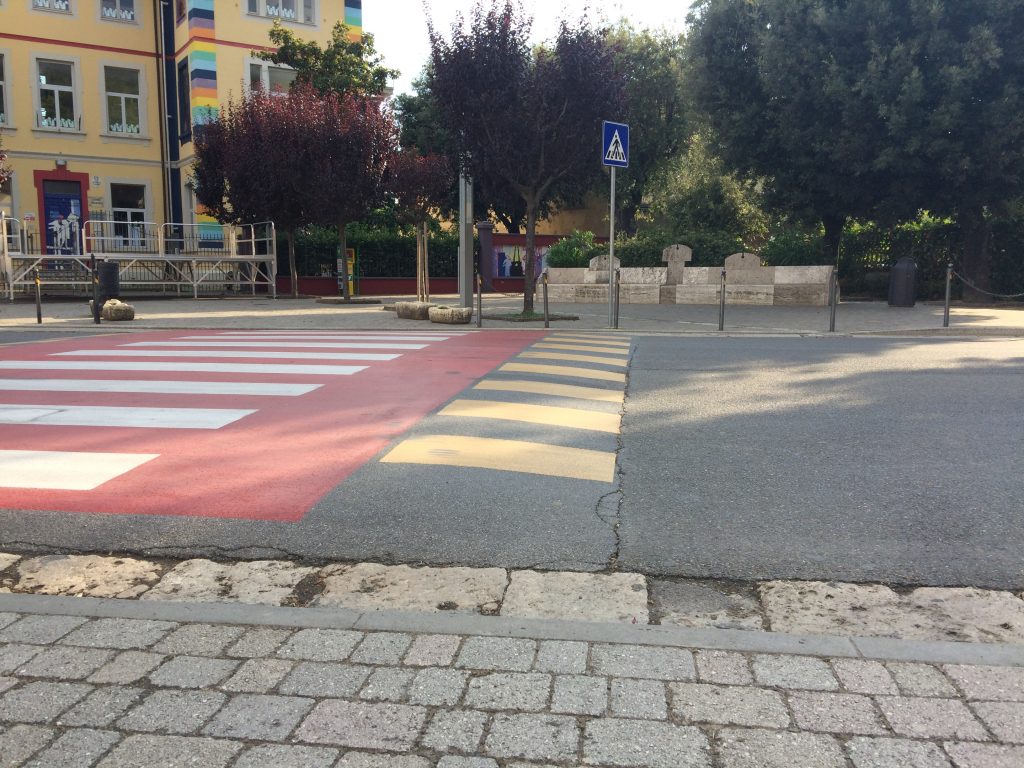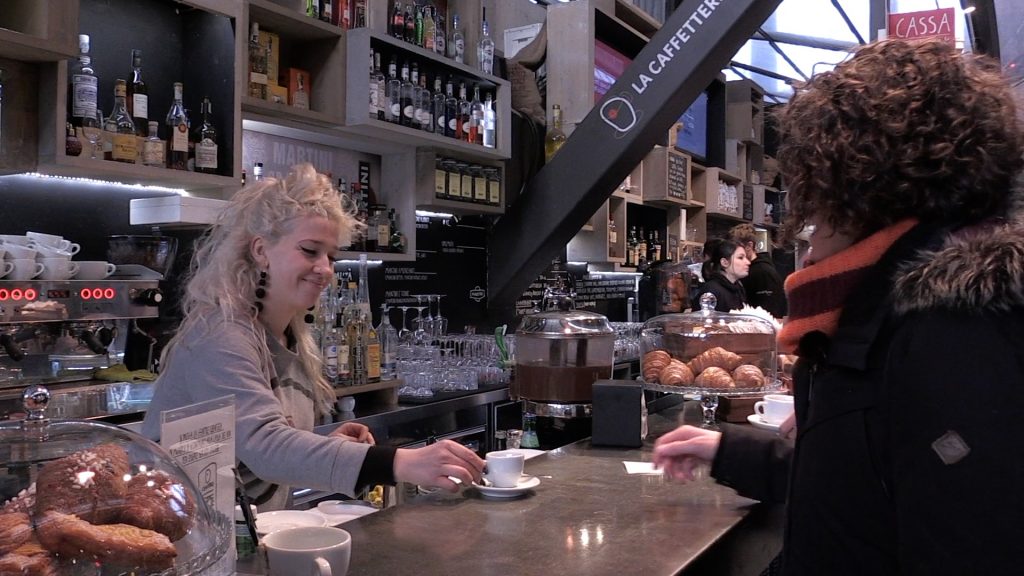When traveling in Italy, you might say or do something that you didn’t intend to: that is, by accident. But if you’re not familiar with certain Italian customs and expressions, or you use a word in the wrong context, you can easily make a fool of yourself or offend someone else. That’s why knowing how to explain that you’ve done something by accident in Italian can prevent an awkward moment or correct a misunderstanding. Let’s look at some Italian words and phrases you can use when accidents happen.
How do you say “accident” in Italian?

a minor accident
Our first Italian term for “accident” is l’incidente, which we use when referring to an actual accident, like falling off a bike or getting into a car crash. As we discuss below, this noun has a false friend in English (“incident”), so it’s important not to mix them up.
Ha fatto un incidente con una moto.
La Ladra – Ep. 5 – Chi la fa l’aspetti – Part 8 of 14
He got in a motorcycle accident.
We were talking about the situation. There’s been an accident…
from Yabla video:
Il Commissario Manara – S1EP2 – Vendemmia tardiva – Part 3 of 17
Using incidente to apologize, explain, or forgive something that happens by accident
In Italian, we can use incidente to clarify that something was not done on purpose. In this case, we add solo (“only,” “just”). To lighten things up a bit, we can also add di percorso (“of the route”): un incidente di percorso can be translated as a “speed bump,” a “bump in the road,” a “blip,” a “hiccup.”
Niente di grave: è stato solo un piccolo incidente di percorso.
Nothing serious. It was just a slight hiccup.

a speed bump (at a crosswalk)
But then how do we say “incident” in Italian?
The temptation will be strong to use incidente the way we use “incident” in English, but as we mentioned above, the words are false friends, so it won’t be accurate. Here are some ways to say “incident” in Italian:
- un episodio (an episode, something that happens)
- un fatto (a fact, something that happens)
- un contrattempo (an unexpected glitch)
So if incidente means “accident,” what does accidente mean in Italian?
Un accidente refers more to a “seizure,” “fit,” or “stroke” – or even simply freaking out in response to a shocking situation or piece of information. So it’s not about a literal heart attack, but a figurative one: un accidente won’t land you in the emergency room.
Il Commissario Manara – S2EP3 – Delitto tra le lenzuola – Part 7 of 14
Guarda, stamattina quando ho letto questo titolo mi è venuto un accidente.
Look at this, when I read this headline this morning, I freaked out.
Accidenti as an interjection:
Accidenti! (“Wow!” “Oh my God!”) is a way of expressing shock without having to use an expletive.
Accidenti is also a somewhat mild swear word:
Accidenti a tutti i cani!
Il Commissario Manara – S1EP6 – Reazione a Catena – Part 7 of 14
Damn all dogs!
When things really happen by chance
Sometimes things do happen completely randomly – and here, we could express “by accident” with un caso (“a coincidence”) or per caso (“by chance,” “at random”). To take it up a notch and express complete randomness, add puro, as in per puro caso (“by pure chance”). Italians also use per caso to say “by any chance.”
Yabla video: Anna e Marika – Hostaria Antica Roma – Part 1
Anna, ma, tu sai per caso quanto è vecchia l’Appia Antica?
Hey Anna, do you know by any chance how old the Ancient Appian Way is?
Things sometimes happen by mistake…
We can also say per sbaglio (“by mistake,” “by accident”). Uno sbaglio is “a mistake,” and the verb sbagliare means “to make a mistake.” It can also mean “by accident.”
Il Commissario Manara – S1EP2 – Vendemmia tardiva – Part 16
Il colpo è partito per sbaglio.
The shot went off by mistake/by accident.
What if I do something on purpose? The opposite of “by accident” in Italian
Let’s start with a word lots of people know: espresso. Un espresso is a single cup of coffee made “quickly” and “expressly” for the person who is going to drink it (see the connection?). In Italian, we often use espressamente as an adverb to mean “intentionally” or – to use a cognate – “expressly.”

an espresso at the bar in the Florence Central Market
“On purpose” … or not?
Sometimes we want to express that we did something “not on purpose” instead of “by accident.” It’s a subtle but important distinction. A typical way to say this in Italian is with non and the adverb apposta. It actually comes from the rarely used verb apostare (“to place,” “to put”). The adverb, however, is important to know for everyday interactions. Here’s a good Italian phrase to memorize and have handy:
Ma che ci faccio qui! – Un film di Francesco Amato – Part 5 of 24
Non l’ho fatto apposta.
I didn’t do it on purpose.
Of course, if you did do something on purpose, you could just say:
L’ho fatto apposta
I did it on purpose.
Related to apposta is appositamente, an abverb that looks more like the standard Italian adverb due to its -mente ending. Appositamente means “expressly,” “specially,” or “specifically.”
Francesca – Cavalli – Part 3 of 3
Questo è il sottosella che si mette sotto alla sella appositamente, per evitare che al cavallo vengano delle fiaccature, che sono delle piccole escoriazioni, principalmente qua al garrese.
This is the saddle pad that you put underneath the saddle specifically to prevent the horse from getting sores, which are little abrasions, mainly here at the withers.
When you didn’t mean to … and you’re sorry
Here’s a handy way to apologize quickly for something you didn’t mean to do:
- Scusa, non volevo... (“Sorry, I didn’t mean to…”) [informal]
- Mi scusi, non volevo... (“Sorry, I didn’t mean to…”) [polite]
Let’s have a closer look at the phrase non volevo. The verb is volere (“to want,” “to want to”). As a matter of fact, Italians use it much like we use “to mean” in English. It’s great to know for when you might say the wrong thing and need to take back what you said:
Non volevo dire quello. (I didn’t mean to say that.)
In the same vein, you might just want to say “I mean” as a verbal filler, just like in English. In this case, you can say:
voglio dire… (I mean…)
Literally, this translates to “I want to say…”
If you would like to learn more about the Italian language and how to start thinking like an Italian, check out the Yabla language learning platform. Yabla offers all kinds of videos featuring Italian native speakers and covering a wide range of subjects, including music, documentaries, movies, TV shows, lessons, and so much more. All of the examples in this article are from actual Yabla videos, so if they pique your interest, check out the Yabla videos page to see what’s on offer.
Learn through the interactive subtitles, vocabulary reviews, and dictation exercises — and go on your own language-learning journey with Yabla.
Yabla offers you the possibility of learning at your own pace, with videos pertaining to your interests. Choose to expand your horizons by learning Italian, one of the most beautiful languages in the world.

A very clear and educational article. I’m glad I found this site.